February 18, 2016 // Uncategorized
Follow the papal visit to Mexico
‘No more death, no more exploitation,’ pope says at U.S.-Mexico border
By David Agren
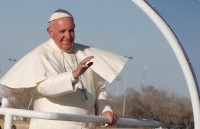
Pope Francis waves from the popemobile after praying at a cross on the border with El Paso, Texas, in Ciudad Juarez, Mexico, Feb. 17. (CNS photo/Paul Haring)
CIUDAD JUAREZ, Mexico (CNS) — Speaking from the symbolic platform of the U.S.-Mexico border, Pope Francis pleaded for the plight of immigrants while warning those refusing to offer safe shelter and passage that their actions and inhospitable attitudes were bringing about dishonor and self-destruction as their hearts hardened and they “lost their sensitivity to pain.”
Recalling the story of Jonah and his instructions from God to save the sinful city of Ninevah by telling the residents that “injustice has infected their way of seeing the world,” Pope Francis’ homily called for compassion, change and conversion on migration issues.
He alluded to Mexico and the United States as Ninevah, the city he said was showing symptoms of “self-destruction as a result of oppression, dishonor, violence and injustice.” He also said mercy was a way to win over opponents.
He also preached urgency.
“We cannot deny the humanitarian crisis which in recent years has meant the migration of thousands of people, whether by train or highway or on foot, crossing hundreds of kilometers through mountains, deserts and inhospitable areas,” Pope Francis said Feb. 17 to hundreds of thousands of people from both sides of the border.
“The human tragedy that is forced migration is a global phenomenon today. This crisis, which can be measured in numbers and statistics, we want to measure instead with names, stories and families.”
The Mass capped a six-day trip to Mexico in which Pope Francis traveled to the northern and southern borders and denounced the indignities of discrimination, corruption and violence. During the trip he also asked oft-oppressed indigenous peoples for their forgiveness and chastised the privileged political and business classes — saying their exclusionary actions were creating “fertile ground” for children to fall into organized crime and drug cartels.
Pope Francis delivered his homily a stone’s throw from the Rio Grande, which has swallowed so many migrants over the years as they vainly tried to enter the United States in search of bettering their lot in life and, more recently, escaping violence enveloping Central America.
The Mass was celebrated as a binational event with thousands watching across the Rio Grande in El Paso and in a college football stadium. Pope Francis saluted the crowds watching at the Sun Bowl stadium and Bishop Mark Seitz of El Paso for providing technological connections that allowed them to “pray, sing and celebrate together” and “make us feel like a single family and the same Christian community.”
The pope focused on migration, along with the dangers migrants encounter en route to their destinations and the difficulties of surviving on the margins of society without protections.
“Being faced with so many legal vacuums, they get caught up in a web that ensnares and always destroys the poorest,” Pope Francis said.
Migration has marked Mexico for generations, though the number of Mexicans leaving the country is now surpassed by those returning — involuntarily or otherwise — as poor job prospects, an increasingly fortified border and anti-immigration initiatives prompt most to stay put.
Ironically, Mexico has assumed an unlikely role over the past several years: enforcer as it detains and deports record numbers of Central Americans trying to transit the country — while many more of those migrants are preyed upon by criminals and corrupt public officials and suffer crimes such as kidnap, robbery and rape. The Mexican crackdown came after thousands of Central American children streamed through Mexico in 2014, seeking to escape forced enlistment in gangs and hoping to reunite with parents living in the shadows of American society, working minimum-wage jobs to support children left with relatives they hadn’t seen in years.
“Each step, a journey laden with grave injustices. … They are brothers and sisters of those excluded as a result of poverty and violence, drug trafficking and criminal organizations,” Pope Francis said, while lauding the priests, religious and lay Catholics who accompany and protect migrants as they move through Mexico — acts of compassion not always popular with the authorities.
“They are on the front lines, often risking their own lives,” he said. “By their very lives they are prophets of mercy. They are the beating heart and accompanying feet of the church that opens its arms and sustains.”
“They are brothers and sisters of those excluded as a result of poverty and violence, drug trafficking and criminal organizations,” Pope Francis said. “Injustice is radicalized in the young. They are ‘cannon fodder,’ persecuted and threatened when they try to flee the spiral of violence and hell of drugs. Then there are the women unjustly robbed of their lives.”
Pope Francis ended his homily by returning to the example of Jonah and his call for conversion in Ninevah. He called “mercy, which always rejects wickedness,” a way to win over opponents, saying it “always appeals to the latent and numbed goodness in every person,” and urged people to follow Jonah’s example.
“Just as in Jonah’s time, so too today may we commit ourselves to conversion,” Pope Francis said. “May we commit ourselves to conversion. May we be signs lighting the way and announcing salvations.”
Ciudad Juarez once held the dubious distinction of “murder capital of the world.” More than 10,000 lives were lost between 2008 and 2012 as drug cartels battled over a coveted smuggling route and young people were seduced by easy money into illegal activities that led to their deaths.
The pope’s visit was promoted by civic officials as a rebirth for Ciudad Juarez, though priests say the city still suffers vices such as exclusion and violence — in lower numbers than before — and jobs with low salaries and long hours in the booming factory for export economy, all of which strain family life.
In silence, pope remembers those who cross Mexican-U.S. border
By Cindy Wooden

Pope Francis prays at a cross on the border with El Paso, Texas, before celebrating Mass at the fairgrounds in Ciudad Juarez, Mexico, Feb. 17. (CNS photo/Paul Haring)
CIUDAD JUAREZ, Mexico (CNS) — At the border of Mexico and the United States, Pope Francis blessed a large cross in memory of all the people who have crossed the frontier.
The pope said nothing Feb. 17, but he clasped his hands tightly in prayer and bowed his head in silent prayer. He left a bunch of flowers on a table in front of the cross.
Then, to the great joy of people, including immigrants, gathered in El Paso, Texas, on the other side of the fence, the pope waved.
The whole thing lasted less than three minutes. But with hundreds of thousands of people waiting in a fairgrounds nearby for Mass, the pope was intent on taking the time to acknowledge the significance of the spot.
At the foot of the large cross were three small crosses, which the pope also blessed. They will go to the dioceses of El Paso, Ciudad Juarez and Las Cruces, New Mexico.
According to the Pew Research Center, there were 11.3 million unauthorized immigrants in the U.S. in 2014 — which makes about 3.5 percent of the nation’s population. Mexicans make up about half of all unauthorized immigrants, the center said in a report in November, though their numbers have been declining in recent years. There were 5.6 million Mexican unauthorized immigrants living in the U.S. in 2014, down from 6.4 million in 2009, the Pew Research Center reported.
But it is not only Mexicans who are crossing the border. More and more of the immigrants apprehended by the U.S. Border Patrol are from violence-torn Central American countries, particularly El Salvador, Guatemala and Honduras.
According to figures released by the U.S. Border Control, 4,353 people have died trying to cross the border from 2005 to 2015.
Cardinal Sean O’Malley of Boston, one of several U.S. bishops at the pope’s Mass in Ciudad Juarez, said the pope’s brief moment at the border memorial was “a great sign of hope for families separated and suffering.”
With 20 years’ experience ministering primarily to migrants, the cardinal said he can guarantee, “they bring an energy and a work ethic and a spirit of adventure that made America a great country.”
Lily Limon, of Our Lady of Mount Carmel Parish in El Paso, whose parents were immigrants from Mexico, put her hand over her heart as she saw the pope bless the border.
“To know that he was this close to us, and he took time to bless and look over to us, to the VIPs seated here, our immigrants, our young people that have crossed over undocumented, our migrant workers, this is just an incredible gesture and for us and unforgettable experience.”
There were about 550 people seated on the U.S. side of the Rio Grande taking part in the Mass.
– – –
Contributing to this story was Nancy Wiechec in El Paso.
Pope tells Mexican prisoners society needs system of ‘social health’
By David Agren
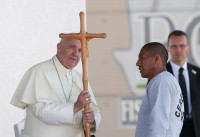
Pope Francis accepts a crucifix from a prisoner as he visits Cereso prison in Ciudad Juarez, Mexico, Feb. 17. (CNS photo/Paul Haring)
CIUDAD JUAREZ, Mexico (CNS) — Pope Francis urged society to rethink its ideas of locking up inmates and throwing away the key, calling such an approach another symptom of the “throwaway culture” he often decries and “a symptom of a culture that has stopped supporting life, of a society that has abandoned its children.”
Speaking in a prison previously plagued by riots and controlled by drug cartels in a city once considered the “murder capital of the world,” the pope proposed focusing on prevention, reintegration and a system of “social health,” instead of on only on incarceration and insisting that inmates pay for their crimes.
“Celebrating the Jubilee of Mercy with you is recalling the pressing journey that we must undertake in order to break the cycle of violence and crime,” Pope Francis said Feb. 17 at Cereso prison, home to some 3,000 inmates.
“We have already lost many decades thinking and believing that everything will be resolved by isolating, separating, incarcerating, and ridding ourselves of problems, believing that these policies really solve problems,” the pope continued. “We have forgotten to focus on what must truly be our concern: people’s lives; their lives, those of their families, and those who have suffered because of this cycle of violence.”
Pope Francis often includes prison visits in his papal tours, drawing attention to a population on the periphery of the church he is trying to construct. Prison officials in Ciudad Juarez say their facility — once considered the most violent in Latin America — has vastly improved since the horror of its worst year 2010, when 216 murders were committed there and rival gangs, fighting for control of drugs running through Ciudad Juarez, carried out crimes from behind bars.
His trip drew attention to the horrors of Mexico’s oft-maligned prison system, marked by overcrowding, corruption and inmates paying for privileges, protection and basics — everything from toilet paper to proper food. Inmate control inside correctional facilities is common.
The trip follows a brawl — blamed on incarcerated members of rival cartels clashing — in a Monterrey prison a week earlier. Forty-nine inmates died. Pope Francis sent condolences for the tragedy in the Topo Chico prison, where state officials subsequently found luxury cells with king-size beds, bars and even a sauna.
In Ciudad Juarez, the pope proposed prevention, along with reintegration and rehabilitation, which he said, “begins outside, in the streets of the city.”
It also “begins by creating a system which we could call social health, that is, a society which seeks not to cause sickness, polluting relationships in neighborhoods, schools, town squares, the streets, homes and in the whole of the social spectrum … a system of social health that endeavors to promote a culture which acts and seeks to prevent those situations and pathways that end in damaging and impairing the social fabric.”
Pope Francis mentioned the Year of Mercy often in his address to inmates, saying: “Jesus urges us to have mercy that embraces everyone and is found in every corner of the world. There is no place beyond the reach of his mercy, no space or person it cannot touch.”
He called concern for prisoners “a moral imperative for the whole society,” in working to toward an improved “common life.”
“It is within a society’s capacity to include the poor, infirm and imprisoned, that we see its ability to heal their wounds and make them builders of a peaceful coexistence,” Pope Francis said. “Social reintegration begins by making sure that all of our children go to school and that their families obtain dignified work by creating public spaces for leisure and recreation, and by fostering civic participation, health services and access to basic services, to name just a few possible measures.”
“Social reintegration begins by making sure that all of our children go to school and that their families obtain dignified work by creating public spaces for leisure and recreation, and by fostering civic participation, health services and access to basic services, to name just a few possible measures.”
Toward the end of the brief meeting, Pope Francis joined the inmates for a moment of silent prayer, telling them that only they knew what they would ask forgiveness for. Several inmates were seen crying as they prayed.
“I tell you from my own wounds, errors and sin,” he said, “that the Lord wants to forgive.”
He ended his talk with the assembled inmates, sitting under sunny skies outside a recently renovated prison chapel, by urging them to no long be “prisoners of the past,” learn to “open the door to the future,” and speak with their loved ones to put an end to “this cycle of violence and exclusion.”
“The one who has suffered the greatest pain, and we could say ‘has experienced hell,’ can become a prophet in society,” he said. “Work so that this society, which uses people and discards them will not go on claiming victims.”
Jesuit Father Federico Lombardi said the pope’s remarks were broadcast to 389 other prisons, with a potential 254,000 inmates watching.
Stop slavery; negotiate wages, working conditions, pope urges Mexicans
By Cindy Wooden
CIUDAD JUAREZ, Mexico (CNS) — God will hold humanity responsible for enslaving the poor and treating people as less important than profits, Pope Francis told Mexican workers and business leaders.
“What kind of world do we want to leave our children?” the pope asked Feb. 17 during a meeting in Ciudad Juarez with 3,000 people representing the “world of work” in a border town known for its factories — maquiladoras — offering low-wage jobs. Mexico’s minimum wage is the equivalent of about $4 a day.
“God will hold today’s slavers accountable, and we must do everything to make sure that these situations do not happen again,” the pope said. “The flow of capital cannot determine the flow and the life of people.”
Daisy Flores Gamez, her husband Jesus Gurrola Varela and two children welcomed the pope; Flores told him the financial struggles caused by the low wages are obvious, but families also are being tested and even destroyed by the long hours workers are expected to put in to earn a pittance.
“We believe the decadence and conflict of values in our society come, in part, from an absence of parents in the home,” she said, pleading with the pope to intercede for them with governments and businesses to institute eight-hour workdays.
Juan Pablo Castanon, president of a national business leaders’ organization, told the pope that half of all Mexicans are poor and six out of 10 workers have no insurance or social security. “With great concern, we see that our efforts over the last decades to overcome poverty have not worked completely.”
He thanked the pope for his visit, assuring him that the business leaders present are committed to a vision of human development that aims at “the sustainability of businesses and sources of jobs,” as well as at promoting a “social dialogue” that will help the whole nation move forward.
Ciudad Juarez, lying on the U.S.-Mexican border, also hosts thousands of Mexicans and Central Americans hoping to cross over into the United States or who already made the crossing, but did so illegally and were sent back to the Mexican side of the border.
The city is infamous as a center of narcotrafficking, is plagued by “pandillas” or armed gangs and, since the early 1990s, has grabbed headlines around the world because of the alarming number of area women who disappeared or were murdered.
Pope Francis told the workers and business leaders that things cannot continue as they have been going and that dialogue and respect for human dignity are the only paths to a better future.
Straying from his prepared text, the pope told those present that he once knew a businessman who would go into negotiations saying, “‘I know I’m going to lose something so that we can all win.’ That man’s philosophy is so beautiful. When you negotiate, you will always lose something, but everyone wins.”
Business owners, just like the workers, have a stake in improving the situation for individuals and for the nation, the pope said. “We do not have the luxury of missing any chance to encounter, discuss, confront or search” for solutions that will provide opportunity while treating human beings with the respect they deserve.
“Anything we can do to foster dialogue, encounter and the search for better alternatives and opportunities is already an accomplishment to be valued and highlighted,” the pope told them.
Looking for common ground, Pope Francis asked the workers and the business people to think about the future they hope for their children and their country. Almost all people would share the same general dream, he said, and they must work together to achieve it.
Responding to Flores’ plea for family-friendly work schedules, the pope told the crowd: “I invite you to dream, to dream of a Mexico where the father has time to play with his children, where a mother has time to play with her children. And you will gain that through dialogue, through negotiating, by losing so that everyone wins.”
“What kind of Mexico do you want to leave your children? Do you want to leave them the memory of exploitation, of insufficient pay, of workplace harassment?” he asked. Or, should the future be one of “dignified work, a proper roof (over one’s head) and of land to be worked?”
The pope continued by asking what air they hope their children will breathe: “an air tainted by corruption, violence, insecurity and suspicion or, on the contrary, an air capable of generating alternatives, renewal and change?”
The interconnections of economic activity, employment and the political and social realities of Mexico are complicated, the pope acknowledged, “but it is worse to leave the future in the hands of corruption, brutality and the lack of equality.”
In a town tense for months with workers demonstrating for tiny wage increases and a right to unionize, Pope Francis said he knows it is not easy to negotiate peacefully “in an increasingly competitive world, but it is worse to allow the competitive world to determine the destiny of the people.”
Profit and capital, he said, must not be given more importance than people; rather they must be assets placed at the service of the common good.
“When the common good is used only in the service of profit and capital,” he said, “the only thing gained is known as exclusion.”
Meeting the workers and business owners on the last day of his six-day visit to Mexico, Pope Francis urged them “to dream of Mexico, to build the Mexico that your children deserve; a Mexico where no one is first, second or fourth; a Mexico where each sees in the other the dignity of a child of God.”
– – –
Contributing to this story was Junno Arocho Esteves in Mexico City.
Pope snaps at pilgrim who caused him to fall into boy in wheelchair
By Junno Arocho Esteves
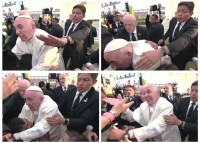
Pope Francis is pulled into the crowd during a Feb. 16 visit to a stadium in Morelia, Mexico, in a combination of still images from pool video. As the 79-year-old pope made his way to greet a boy in a wheelchair, one of the many pilgrims reaching out to touch him pulled his arm, causing him to fall over the disabled youth. (CNS photo/Mexican Government Televison pool via Reuters)
MORELIA, Mexico (CNS) — Excitement turned potentially dangerous and elicited an angry snap from Pope Francis at a meeting with young people in Morelia Feb. 16.
As the 79-year-old pope made his way to greet a boy in a wheelchair, one of the many pilgrims behind the boy pulled the pope’s arm, causing him to fall over the disabled youth.
Security personnel immediately helped him up as the pilgrim continued to latch onto him. Visibly concerned for the young boy in the wheelchair he leaned against, the pope emphatically scolded the young pilgrim, saying: “Pero que te pasa? No seas egoista! No seas egoista!” (“What is the matter? Don’t be selfish! Don’t be selfish!”)
The scene, which was witnessed by thousands watching the event, prompted organizers to plead with pilgrims to show some restraint.
“Please contain yourself,” the announcer said. “Pope Francis wants to greet us, but if we pile up, it will be difficult to do so.”
Later, the Vatican spokesman, Jesuit Father Federico Lombardi, said, “It was a very human, very normal reaction” to a situation that was potentially dangerous and one that came near the end of a long day.
Jesus calls us to be disciples, not hitmen, pope tells youth
By Junno Arocho Esteves
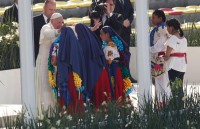
Pope Francis greets girls in traditional dress during a meeting with young people at the Jose Maria Morelos Pavon Stadium in Morelia, Mexico, Feb. 16. (CNS photo/Paul Haring)
MORELIA, Mexico (CNS) — Jesus never sends anyone out as a hitman, dealing in death, but calls Christians to be his disciples and friends, Pope Francis told Mexico’s youth.
“Today the Lord continues to call you, he continues to draw you to him, just as he did with the Indian, Juan Diego,” to whom Our Lady of Guadalupe appeared, he told tens of thousands of young people at Morelia’s Jose Maria Morelos Pavon Stadium Feb. 16.
Dozens of young people carried flags representing every diocese of Mexico present in the packed stadium or watching on big screens set up in a field outside. The pope not only greeted those present in Morelia but also thousands of Mexican youths following the event live from Guadalajara.
Echoing his words to government authorities earlier in the week, the pope reminded the youths that they are the wealth of Mexico and of the church.
“A mountain can have rich minerals that will serve humanity’s progress; that is its wealth. But it only turns into wealth when the miners who take out the minerals work on it. You are the wealth, and you must be transformed into hope,” the pope said, in one of several departures from his prepared speech.
However, Pope Francis recognized the difficulties of recognizing one’s value when material wealth, fashion and prestige become symbols of one’s worth.
“The biggest threat is when a person feels that they must have money to buy everything, including the love of others. The biggest threat is to believe that by having a big car you will be happy,” he said
The pope said belief in Jesus is a sure source of hope and can help youths fight back against the influence of drug dealers “or others who do nothing but sow destruction and death.”
“It is Jesus Christ who refutes all attempts to render you useless or to be mere mercenaries of other people’s ambitions,” he said.
Jesus is the one word of hope that can help young people live fully and do their best for their friends, neighborhoods and communities, he said. While faith may not give them “the latest car model” or “pockets filled with money,” it brings the experience of being loved, embraced and accompanied, which “no one can take away.”
Departing yet again from his speech, the pope recalled a song often sung by mountain climbers.
“While they climb, they sing: ‘In the art of ascending, the victory isn’t in not falling, but in not remaining fallen,'” he said.
The young can be certain that Jesus always will stretch out a hand to help them up, he said. Sometimes he “sends you a brother or sister to speak to you and help you. Don’t hide your hand when you’ve fallen. Don’t tell him: ‘Don’t look at me because I’m all dirty, don’t look at me because I have no hope.’ Just reach out your hand and hold onto his.”
In turn, a young Christian must “stretch out your hand” to help others in Jesus’ name, particularly with “listening-therapy.”
“Let them speak, let them talk. And little by little, they’ll start stretching out their hand and you will help them in Jesus’ name. But if you go in one shot and start preaching — and hitting them over and over — you leave the poor guy worse than he was before,” he said.
Pope Francis urged young Mexicans to remember: “You are the wealth of this country, and when you doubt this, look to Jesus, who destroys all efforts to make you useless or mere instruments of other people’s ambitions.”
Devil wants church resigned to violence; resist him, pope says
By Cindy Wooden
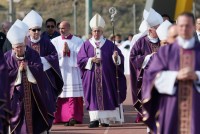
Pope Francis arrives in procession to celebrate Mass with priests and religious at a stadium in Morelia, Mexico, Feb. 16. (CNS photo/Paul Haring)
MORELIA, Mexico (CNS) — The devil loves Christians — especially priests and nuns — who are resigned to the violence and corruption around them, Pope Francis said.
Celebrating Mass Feb. 16 at a stadium in Morelia, Pope Francis repeated his frequent call to priests, religious and seminarians to get out of their churches and convents and take God’s mercy and offer of salvation to the world.
But in Morelia, the geographic center of Mexico and capital of Michoacan state — a stronghold of the Knights Templar drug cartel — the pope was not talking just about traditional evangelization.
The pope’s message was an encouragement to those priests and religious who literally risk their lives standing up to the drug lords and urging their faithful to do the same.
Mexico’s Catholic Multimedia Center reported in early February that 40 priests in Mexico have been murdered or simply disappeared in the past 10 years. Many of the cases are clearly linked to the priests’ denunciation of the drug trade.
Pope Francis told an estimated 20,000 church workers gathered in the stadium that the Christian faith is not a matter for the intellect alone or something that occupies a few hours each day or each week. It is about one’s life.
Jesus, he said, did not simply teach his disciples, he brought them into his life, showing them who he was and how they were to live by keeping them with him as he ate, slept, cured, preached and prayed.
“He invited them to share his life,” the pope said, and when he prayed and referred to God as “father,” it was not simply a word, but contained “a sense of life, of experience, of authenticity.”
All Christians, but especially those charged with the pastoral care of others, also must share Jesus’ life with them.
“Woe to us if we are not witnesses to what we have seen and heard. Woe to us,” he said.
“We are not and do not want to be ‘administrators of the divine,'” he said. “We are not and do not want to be God’s employees, for we are invited to share in his life.”
In his Lenten reflection, Pope Francis asked the priests and religious to think about the temptations they face in their lives.
“What temptation can come to us from places often dominated by violence, corruption, drug trafficking, disregard for human dignity and indifference in the face of suffering and vulnerability?” he asked.
The big temptation, he said, is resignation.
In the face of overwhelming violence and death, the pope said, “the devil can overcome us with one of his favorite weapons: resignation. A resignation that paralyzes us and prevents us not only from walking, but also from making the journey.”
The devil wants to sow a resignation “which not only terrifies us, but which also entrenches us in our ‘sacristies’ and false securities,” he said. Such an attitude “not only hinders our looking to the future, but also thwarts our desire to take risks and to change.”
Some of the prayers at the Mass were offered in Purepecha, and Pope Francis called for special care of the Purepecha indigenous people. As a model of one who resisted the temptation of resignation, he offered Bishop Vasco Vazquez de Quiroga, the first bishop of Michoacan. Ministering in the mid-1500s, the Spaniard was shocked by how the Purepecha were treated, enslaved and impoverished.
Bishop Vazquez did not fall prey to resignation, but was inspired to act “in the midst of so much paralyzing injustice. The pain and suffering of his brothers and sisters became his prayer, and his prayer led to his response.”
The Purepechas referred to him as “Tata Vasco,” which means “father, dad, daddy,” the pope said. It is the same kind of language Jesus used when referring to God.
Pope Francis ended his homily with a prayer: “Father, dad, daddy, lead us not into the temptation of resignation ….” He also told the priests and religious that the pastoral staff and chalice he was using at the Mass belonged to Bishop Vazquez.
The pope’s somber homily was a contrast with the atmosphere of fiesta that preceded his arrival. Filling the stands and the field of the sports stadium, the priests and religious sang with gusto and chanted papal cheers while jumping up and down or doing the wave.
Pope Francis was welcomed to Morelia with the largest crowds of his Mexico trip, which began Feb. 12. Thousands of people — standing five and six deep — lined miles of roadway leading to the stadium.
– – –
Contributing to this story was Junno Arocho Esteves.
Pope’s visit is a call to live a merciful life, cloistered nun says
By Junno Arocho Esteves
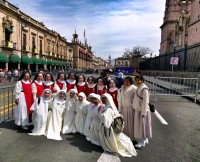 MORELIA, Mexico (CNS) — Pope Francis’ visit to Morelia will be a call for those suffering to continue along the path of good and an encouragement for those in religious life to live their vocations with mercy, tenderness and love, said a cloistered Mexican nun.
MORELIA, Mexico (CNS) — Pope Francis’ visit to Morelia will be a call for those suffering to continue along the path of good and an encouragement for those in religious life to live their vocations with mercy, tenderness and love, said a cloistered Mexican nun.
Sacramentine Sister Maria de Jesus de la Ostia Santa said her expectations “had changed quite a bit” since the pope’s arrival.
“We thought he was coming with another kind of message, and what we have seen is that he is asking those in consecrated life to live in mercy, in tenderness and in love,” she told Catholic News Service Feb. 15.
Sister Maria, from the Diocese of Tlaxcala, traveled six hours by bus with 18 of her fellow sisters to attend the pope’s Mass with priests, seminarians, religious men and women and consecrated people Feb. 16.
While workers were frantically making final preparations for the pope’s visit to the Cathedral of Morelia, the joyful group of sisters attracted quite a bit of attention, even posing for pictures with pilgrims.
Sister Maria said those in religious and consecrated life have a particular affinity for the Jesuit pope who, like them, “has also taken vows.”
“We just want to show him our affection and love and to also listen to what he tells us as a father who is also a religious (person),” she said.
Morelia, the capital city of Michoacan state, is not only the geographical center of Mexico, but is also near the epicenter of organized crime, drug trafficking and extreme violence. The city lies near the Tierra Caliente region, the stronghold of the infamous Knights Templar drug cartel.
Despite the immense suffering faced by people within the state, there are “still many good people” who continue to work toward building peace, Sister Maria said. The pope, she added, will come to “part the sea” and show the good people of Michoacan that a path of hope still exists.
“I think that more than anything, he is coming to give encouragement,” she said. “Yes, there are realities that we are facing, but I can say that since we have arrived in Michoacan, we have found good people, beautiful people; so we can’t classify the whole state as bad.”
The Mexican nun said she believes the pope’s words will also be a call to action through prayer for her, her fellow sisters and those in religious and consecrated life. However, in order to transform the lives of others, the lives of those in consecrated life “must also transform.”
The pope’s call to live in tenderness and love and to be a reflection of God’s infinite mercy is “good because we often forget that part about God,” she said.
“I think the pope will speak to us along those lines; in that context of love, mercy and forgiveness, because a person in consecrated life must live that more than anyone,” she said.
For Sister Maria and her Sacramentine sisters, a face-to-face meeting with Pope Francis would be a dream of a lifetime. Yet, they only have one simple wish: a papal blessing.
“That’s what we hope for: that he blesses us and that we be faithful and persevere in following our Lord Jesus Christ,” Sister Maria said.
In southern Mexico, pope warns against diminishing importance of family
By David Agren
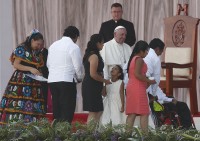
Pope Francis greets people during a meeting with families at the Victor Manuel Reyna Stadium in Tuxtla Gutierrez, Mexico, Feb. 15. (CNS photo/Paul Haring)
SAN CRISTOBAL DE LAS CASAS, Mexico (CNS) — Pope Francis warned against moves to diminish the importance of the family, peppering his talk with anecdotes and off-the-cuff remarks that kept a packed soccer stadium cheering, laughing and applauding.
Speaking under a scorching-hot sun as dozens were treated for heat stroke, the pope said family life was not always easy and often was a struggle, but he pleaded for perseverance, saying family life was one of the solutions to increasing isolation and uncertainty and its unintended consequences.
“I prefer a wounded family that makes daily efforts to put love into play to a society that is sick from isolationism and is habitually afraid of love,” Pope Francis said Feb. 15 in front of a boisterous audience of families, who came from across southern Mexican and nearby Guatemala for a celebration in the city of Tuxtla Gutierrez. “I prefer a family that makes repeated efforts to begin again to a society that is narcissistic and obsessed with luxury and comfort. I prefer a family with tired faces from generous giving to faces with makeup that know nothing of tenderness and compassion.”
The pope’s focus on families turned the focus of his six-day visit toward the pastoral issues after hitting hard on matters such as corruption, crime and the country’s often impoverished and exploited indigenous populations.
During the event, a couple from the city of Monterrey — one of whom was divorced — spoke of the stigma and sense of not belonging by not being able to receive Communion, but finding a home in the Catholic Church by serving others and organizing pastoral projects.
“As we came close to our church, we received loved and compassion,” said Humberto and Claudia Gomez, who are married civilly, but not in the church. “It’s marvelous to have a marriage and family in which God is at the center.”
Another speaker, single mother Beatriz Munoz Hernandez, 52, spoke of a childhood marked by “poverty, violence and abandonment” by her father, then of becoming pregnant as a teenager.
“I found the love of God through his church and he rescued me, announced that he loved me, that he didn’t reject me and, above all, that he forgave me,” said Munoz, adding her faith helped in overcoming the temptation of seeing abortion as a solution to several pregnancies.
Pope Francis cracked jokes throughout his speech and strayed from his prepared text. He mentioned a couple married for 50 years and asked “who was the most patient.” The answer was obvious for the pope: “Both of them.”
Departing from prepared remarks, he offered advice for creating happy families and keeping the peace in times of turbulence.
“Do not end the day without making peace,” Pope Francis said. “If you end the day in war, you will end up in cold war, and a cold war is very dangerous in the family, because it will undermine families from underneath.”
Pope Francis focused most on overcoming isolation and uncertainty and its insidious effects.
“Uncertainty is not only a threat to our stomach (which is already serious), but it can also threaten our soul, demoralizing us and taking away our energy, so that we seek apparent solutions that, in the end solve nothing,” he said. “There is a kind of uncertainty which can be very dangerous, which can creep in surreptitiously; it is the uncertainty born of solitude and isolation.”
He cited the example of Humberto and Claudia and their service to others as a solution. Another solution, he said, was with smart public policy, “which protects and guarantees the bare necessities of life so that every home and every person can develop through education and dignified employment.”
“Laws and personal commitment,” the pope said, “are a good pairing to break the spiral of uncertainty.”
Family is often seen as a social safety net in Mexico and a pillar in a low-trust society, though state statistics show people are marrying less, divorcing more and increasingly living in nontraditional families.
‘Tatic Francis’ affirms Mexico’s indigenous people in visit to Chiapas
By Cindy Wooden
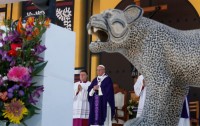
A panther decorates the altar as Pope Francis celebrates Mass with the indigenous community from Chiapas in San Cristobal de Las Casas, Mexico, Feb. 15. (CNS photo/Paul Haring)
SAN CRISTOBAL DE LAS CASAS, Mexico (CNS) — Paying homage to the culture and ancient wisdom of Mexico’s indigenous peoples, Pope Francis urged them to hold on to hope and condemned those who exploit their people and their land.
“Some have considered your values, culture and traditions to be inferior. Others, intoxicated by power, money and market trends, have stolen your lands or contaminated them,” the pope said at a Mass Feb. 15 with representatives of Mexico’s indigenous communities.
“You have much to teach us,” he told the elders, activists and simple faithful gathered at a sports complex in San Cristobal de Las Casas, a city in Chiapas, Mexico’s southernmost state, and a center of advocacy and struggle for the indigenous rights.
Chiapas, and particularly the Diocese of San Cristobal de Las Casas, also has been a center of official Catholic support for indigenous culture, support that was not always shared by all of Mexico’s bishops.
During his stay in the city, Pope Francis communicated the Vatican’s official approval of the use of the local languages in liturgical prayer. Two of the languages — Tzotzil and Tzeltal — were used for some of the readings and prayers during the pope’s Mass. And, after the pope read his homily in Spanish, it was translated for the many in the crowd who speak only their Mayan tongue.
It was under Pope Francis that the diocese was allowed to start ordaining permanent deacons again in 2014 after ordering a 12-year suspension. The vast majority of the diocese’s more than 300 permanent deacons are married leaders in their indigenous communities; the late Bishop Samuel Ruiz Garcia began ordaining large numbers of the leaders in a program of pastoral outreach that many saw as exaggerating the place of indigenous culture in the local church, but also as a potential first step toward pushing for married priests for indigenous communities.
As the pope toured the crowd in the popemobile, a priest led the people in chanting: “Welcome, pope of peace. Welcome, pope of mercy. Welcome, pope of justice. Welcome, pope of freedom. Welcome, pope of the struggle.”
The cheer also hailed the pope for wanting “a church that is born of the people” and bishops and priests who are “alongside the poor.”
To applause, the priest also acclaimed, “The people walk with Tatic Samuel (Bishop Ruiz) and Tatic Francis, who encourages us.” Tatic is the Mayan word for father.
In a country rich in natural resources, but scarred by pollution and inequality, Pope Francis compared the indigenous communities to the ancient Israelites enslaved in Egypt, and he assured them that God hears their cry for dignity and respect and their longing to protect their cultures.
In responding to the oppression of the Israelites, the pope said, God showed them his true face, “the face of a father who suffers as he sees the pain, mistreatment and lack of justice for his children.”
“They say that Chiapas is a rich state, but we don’t know where these riches are,” said Manuel Mendez, a vegetable farmer. Wearing a lambs-wool robe at Mass, Mendez comes from the tough indigenous town of San Juan Chamula — where the local authorities clashed with Bishop Ruiz and refused to allow his priests to serve while he led the diocese.
The federal and state governments have sent enormous sums of money to Chiapas since the 1994 Zapatista uprising of indigenous, but poverty rates have remained unchanged and still top 75 percent of the population.
“It’s better, but there are still great needs,” said Domingo Lopez, a corn farmer from the municipality of Oxchuc, who camped out overnight in the cold at the Mass site with 11 family members.
Pope Francis quoted “Popol Vuh,” a collection of traditional indigenous literature, which says, “The dawn rises on all of the tribes together. The face of the earth was immediately healed by the sun.” The story, he said, illustrates how “the sun rose for the people who at various times have walked in the midst of history’s darkest moments.”
The quotation expresses a yearning for freedom and for reaching “a promised land where oppression, mistreatment and humiliation are not the currency of the day,” Pope Francis said.
Mexico’s indigenous and many other people around the world still yearn for such a land and “for a time when human corruption will be overcome by fraternity, when injustice will be conquered by solidarity and when violence will be silenced by peace.”
Today, too, God suffers when his children do, he said. In his greatest sign of solidarity with humanity, God sent his son into the world to live like them and to suffer and die to save them.
God’s son rose “so that darkness may not have the last word and dawn may not cease to rise on the lives of his sons and daughters,” the pope told the people.
The yearning for freedom and a bright future is something to hold on to and keep alive, Pope Francis said. People must resist attempts others make to silence their yearning, “anesthetize our soul” or “lull our children” into thinking that nothing can change and their dreams will never come true.
The main road leading to the sports center was decorated with banners featuring photos of local people and quotations from Pope Francis, many of them from his encyclical, “Laudato Si’,” on safeguarding creation.
At the Mass, the pope praised the indigenous people’s wisdom in caring for the earth and encouraged their efforts to defend it from further destruction.
“The environmental challenge that we are experiencing and its human causes, affect us all and demands our response,” he said. “We can no longer remain silent before one of the greatest environmental crises in world history.”
– – –
Contributing to this story was David Agren in San Cristobal de Las Casas.
In crime-plagued periphery, pope preaches conversion
By Cindy Wooden
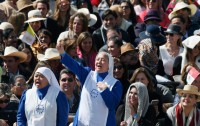
Nuns cheer as they wait for Pope Francis’ arrival to celebrate Mass in Ecatepec near Mexico City Feb. 14. (CNS photo/Paul Haring)
ECATEPEC, Mexico (CNS) — Pope Francis began his travels to Mexico’s “peripheries” by visiting an overcrowded, sprawling settlement known internationally as a hunting ground for girls to force into prostitution and for boys to enlist in the drug trade.
Ecatepec, on the northern edge of Mexico City, also has tidy gated communities and a new shopping mall with department stores like Sears, a big WalMart, Starbucks and dozens of other shops and restaurants.
Pope Francis celebrated Mass Feb. 14 on a vast open field with some 300,000 people. The high altar platform was decorated with Aztec designs — flowers and birds — made of flowers and petals.
More than 1.7 million people live in Ecatepec, which, Vatican Radio described as “a lawless neighborhood where organized crime, pollution and poverty reign and where most people fear to tread.” Like Ciudad Juarez in the north was a decade ago, Ecatepec has now become famous as a place where it is particularly dangerous to be a woman because of murders, kidnappings and human trafficking.
Sister Angelica Garcia Barela, a member of the Servant Missionaries of the Word, was thrilled the pope was visiting. “He comes to show the faith and to change hearts. The pope’s faith, his enthusiasm and joy, isn’t fleeting and it’s contagious. Much can change.”
With other members of her order, Sister Garcia spent the night at the Mass site so she would be in place early to watch over the pre-consecrated hosts she would help distribute during Communion to people far from the papal altar.
Her main ministry is going door to door sharing the Bible with families. She knows how to evangelize and said Pope Francis is the perfect example of “evangelization through presence.”
After Mass, Pope Francis recited the Angelus with the thousands gathered on the dusty field. Before leading the prayer, he recognized “how much each one of you has suffered to reach this moment, how much you have ‘walked’ to make this day a day of feasting, a time of thanksgiving.”
He urged the people to step up and work together to “make this blessed land of Mexico a land of opportunities.”
It should be a land where, he said, there is “no need to emigrate in order to dream, no need to be exploited in order to work, no need to make the despair and poverty of many the opportunism of a few, a land that will not have to mourn men and women, young people and children who are destroyed at the hands of the dealers of death.”
In his homily, Pope Francis did not specifically mention the violence against women or the drug traffickers, but instead addressed the ways in which people give into little temptations that too easily grow into great evil.
In the Gospel story of Jesus being tempted by the devil in the desert, the pope said, “Jesus does not respond to the devil with his own words, instead he uses the words of God, the words of Scripture. Because, brothers and sisters, ingrain this in your minds: You cannot dialogue with the devil!
“You cannot dialogue with the devil because he will always win,” he insisted. “Only the power of the word of God can defeat him.”
Lent, the pope said, is a time of conversion, which involves acknowledging each day how the devil tries to tempt and divide people. In a country known for huge inequalities in income and opportunity, Pope Francis denounced as a work of the devil the idea of “a society of the few and for the few.”
“Three great temptations” — wealth, vanity and pride — are behind such an attitude and so many other ills that destroy society and attack human dignity, he said.
The sinful use of money and material things, he said, is “seizing hold of goods destined for all and using them only for ‘my own people.'” It involves living off the sweat and labor of others, “even at the expense of their very lives,” the pope said.
Such “bread,” he said, “tastes of pain, bitterness and suffering. This is the bread that a corrupt family or society gives its own children.”
“We know what it means to be seduced by money, fame and power,” Pope Francis said. “For this reason, the church gives us the gift of this Lenten season, invites us to conversion, offering but one certainty: he is waiting for us and wants to heal our hearts of all that tears us down. He is the God who has a name: mercy. His name is our wealth.”
At the end of Mass, Bishop Oscar Dominguez Couttolenc of Ecatepec told the pope that “like many other places, we experience poverty and violence, made flesh in the pain of those who suffer because of corruption, hunger, poverty and all the manifestations of evil that lead to the deterioration of our common home.”
In response, he said, the faithful of Ecatepec pray, reflect and work, trying to live a “spirituality of communion,” a sense of solidarity strengthened by the pope’s visit.
Before landing by helicopter in Ecatepec, Pope Francis was treated to a special aerial viewing of the nearby Teotihuacan Pyramids, believed to date from about 300 B.C.
– – –
Contributing to this story was Junno Arocho Esteves in Mexico City.
At children’s hospital, pope prescribes ‘kindness therapy’
By Junno Arocho Esteves
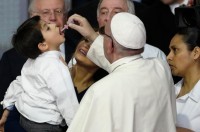
Pope Francis gives a vaccine to a boy held by Mexico’s first lady Angelica Rivera during a visit to the Federico Gomez Children’s Hospital of Mexico in Mexico City Feb. 14. (CNS photo/Paul Haring)
MEXICO CITY (CNS) – A little bit of kindness can go a long way when recovering from illness, Pope Francis told a group of young patients.
“Not only medicine but also ‘kindness therapy’ can make you live your time here with greater joy,” the pope said Feb. 14.
The pope arrived ahead of schedule to the Federico Gomez children’s hospital in Mexico City after a visit to Ecatepec, just north of Mexico City. First lady Angelica Rivera and 38 young cancer patients welcomed him to the hospital’s oncology ward.
Making his way around the room, the pope greeted all the children individually, handing each one a rosary. He gave one boy what he said was his own rosary, blessing it and asking him to “take care of it for me and pray for me when you can.”
The excitement was difficult for the young patients to contain and several stood up from their wheelchairs to embrace the pope. As he made his rounds throughout the hospital, the children handed him drawings. One patient surprised the pope with a heartfelt rendition of Schubert’s Ave Maria.
Thanking them for their warm welcome, the pope said he was grateful for the opportunity to visit them and “share a little of your life and of those who work here.”
The pope briefly told the children the story of Jesus’ presentation in the temple and how the Gospel’s story of Simeon’s grandfatherly reaction is a lesson which teaches “two attitudes: gratitude and blessing.”
“For my part — and not only because of my age — I feel I can relate well with these two lessons of Simeon,” the 79-year-old pope said. “Entering here and seeing your eyes, your smiles, your faces has filled me with a desire to give thanks.”
Hospital staff asked Pope Francis to help them launch a polio vaccine campaign, which he did with the willing cooperation of 5-year-old Rodrigo Lopez Miranda. The little boy opened his mouth wide as the pope squeezed the medicine from a dropper and said, “Swallow it.” The boy rewarded the pope with a drawing and practically climbed into his arms for a hug.
The feeling of being cared for and accompanied is important in one’s recovery, he said. The pope thanked the doctors, nurses and families present for their tenderness and care toward the little patients.
“Kindness therapy is so important; sometimes a caress can help so much to recuperate,” he said.
Recalling the story of St. Juan Diego, whose sick uncle was healed by Mary, Pope Francis told the children to “ask her to give us the gift of her son, Jesus. Let us close our eyes and ask her to give us what our hearts seek today.”
Pope makes long-awaited visit to Our Lady of Guadalupe
By Junno Arocho Esteves
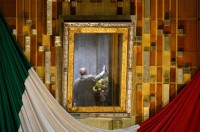
Pope Francis touches the original image of Our Lady of Guadalupe after celebrating Mass in the Basilica of Our Lady of Guadalupe in Mexico City Feb. 13. The Marian image was rotated for the pope to pray in the “camarin” (“little room”) behind the main altar. (CNS photo/Paul Haring)
MEXICO CITY (CNS) — Pope Francis fulfilled his much-desired wish to pray in silence before the miraculous image of Our Lady of Guadalupe
After celebrating the first Mass of his papal trip to Mexico Feb. 13, the pope made his way to the “camarin” (“little room”) behind the main altar of the basilica dedicated to Mary. The miraculous mantle, which normally faces the congregation, can be turned around to allow a closer and more private moment of veneration.
Laying a bouquet of yellow roses in front of the image, the pope sat down in prayerful silence with eyes closed and head bowed. After roughly 20 minutes, the pope stood up, laid his hand on the image and departed from the small room.
About 12,000 people packed the basilica for the papal Mass and another 30,000 were watching on screens set up in the outer courtyard. Built in 1976, the Basilica of Our Lady of Guadalupe is located near Tepeyac hill, the site of Mary’s apparitions to St. Juan Diego in 1531. With some 12 million people visiting each year, it is Catholicism’s most popular Marian shrine.
In his homily, the pope reflected on the Gospel reading, which recalled Mary’s visit to her cousin Elizabeth. Mary’s humility in saying “yes” to God’s will, he said, is a response “which prompted her to give the best of herself, going forth to meet others.”
That very humility also led her to appear to a poor indigenous man, he said. “Just as she made herself present to little Juan, so too she continues to reveal herself to all of us, especially to those who feel — like him — ‘worthless,'” the pope said.
Recalling the miraculous appearance of Mary’s image, Pope Francis noted that through such a miracle, “Juan experienced in his own life what hope is, what the mercy of God is.”
The pope said that despite the indigenous saint’s feelings of inadequacy, Mary chose him to “oversee, care for, protect and promote the building of this shrine.”
“In this way, she managed to awaken something he did not know how to express, a veritable banner of love and justice: no one could be left out in the building of that other shrine: the shrine of life, the shrine of our communities, our societies and our cultures,” he said.
God’s true shrine, he added, is the life of his children, especially young people without a future, the elderly who are often unacknowledged and forgotten and families lacking even the most basic necessities.
“The shrine of God is the faces of the many people we encounter each day,” the pope said.
Pope Francis said that those who suffer do not weep in vain and their sufferings are a silent prayer that rises to heaven, “always finding a place in Mary’s mantle.”
Like St. Juan Diego, Christians are called to be Mary’s ambassadors and console those who are overwhelmed by trials and sufferings, he said.
“‘Am I not your mother? Am I not here with you?’ Mary says this to us again. Go and build my shrine, help me to lift up the lives of my sons and daughters, your brothers and sisters,” the pope said.
Pope Francis tells Mexican bishops be unified, speak out on tough issues
By David Agren
MEXICO CITY (CNS) — Pope Francis demanded forceful denunciations of drug violence in Mexico from the c
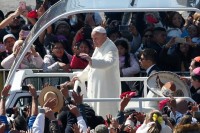
Pope Francis greets the crowd gathered in Mexico City’s main square as Pope Francis arrives for a meeting with the nation’s bishops in the cathedral Feb. 13. (CNS photo/Paul Haring)
ountry’s bishops, who have preferred timid pronouncements instead of speaking prophetically on a tragedy that has claimed more than 100,000 lives over the past 10 years and left another 25,000 Mexicans missing.
Speaking Feb. 13 to an audience of bishops in Mexico City’s Metropolitan Cathedral, Pope Francis urged them to confront the scourge of drug cartels and organized crime by raising their voices, developing pastoral plans, and “drawing in and embracing the fringes of human existence in the ravaged areas of our cities.”
“I urge you not to underestimate the moral and anti-social challenge, which the drug trade represents for young people and Mexican society as a whole,” Pope Francis said. “The magnitude of this phenomenon … and the gravity of the violence … do not allow us as pastors of the church to hide behind anodyne denunciations.”
The pope spoke to the Mexican bishops for more than 40 minutes, delivering a tough talk on matters the pope plans to highlight in his six-day Mexican trip, including violence, migrants and indigenous issues. In off-the-cuff remarks, he warned of “the temptation of aloofness and clericalism” for bishops, called for clerical transparency and asked for unity in the Mexican bishops’ conference, which has pursued closer ties with political leaders in recent years, while speaking softly — if at all — on uncomfortable issues such as corruption.
Pope Francis hit hardest on the drug issue, something retired Pope Benedict XVI said nothing about in his 2012 trip to Mexico. It’s an issue that has vexed Mexico and the Catholic Church over the past decade as a crackdown on drug cartels and organized crime has caused violence to rise, along with offenses such as extortion and kidnap. Many of those victims and victimizers were baptized Catholics.
The violence has claimed the lives more than a dozen priests over the past five years, while some dioceses have been accused to collecting “narcolimosnas” or “drug alms,” and drug bosses — who often consider themselves proper Catholics — construct and fix parishes and sponsor patron saint feast days.
Pope Francis urged “prophetic courage” and implementing a pastoral approach of going to the peripheries, working with families and building bridges with parish communities, schools and the authorities, saying that only then “will people finally escape the raging waters that drown so many, either victims of the drug trade or those who stand before God with their hands drenched in blood, though with pockets filled with sordid money and their consciences deadened.”
Pope Francis also alluded to the folkloric Santa Muerte, a skeletal pseudo-saint attracting hordes of followers in Mexico and Latin America, including many in the illegal drug trade.
“I am particularly concerned about those many persons who, seduced by the empty power of the world, praise illusions and embrace their macabre symbols to commercialize death in exchange for money which, in the end, ‘moth and rust consume,'” he said.
The rise of Santa Muerte worship over the past 15 years has alarmed the Mexican church and drawn Vatican condemnations, said Andrew Chesnut, religious studies professor at Virginia Commonwealth University, who has studied the pseudo-saint and estimates it now has 10 million followers in Mexico and abroad.
“It’s the chief concern of the Mexican church in terms of religious rivals,” he said. “A week doesn’t go by in which some Mexican bishop or priest denounces it as satanic.”
Still, Pope Francis praised popular piety, common in Mexico, where the faithful adore the saints and participate in pilgrimages, while ignoring the sacramental part of the church.
“I invite you to give yourselves tirelessly and fearlessly to the task of evangelizing and deepening the faith by means of a mystagogical catechesis that treasures the popular religiosity of people,” Pope Francis said. “Our times require pastoral attention to persons and groups who hope to encounter the living Jesus.”
He also lauded the church for its work with the many mostly Central American migrants transiting the country on trips that expose them to crime such as extortion, robbery and rape.
“There are millions of sons and daughters of the church who today live in the diaspora or who are in transit, journeying to the North in search of new opportunities,” he said, calling migration, “the challenge of our age.”
Pope Francis plans to celebrate Mass a stone’s throw from the U.S. border in Ciudad Juarez Feb. 17, when he is expected to expand on the migrant issue.
The pope travels to Chiapas at the other end of the country Feb. 15 for a Mass with Mexico’s indigenous peoples, who have fallen away from the church in droves. He urged the bishops to build a church more inclusive for indigenous peoples, who often live in impoverished conditions and in communities where Spanish is seldom spoken.
“I ask you to show singular tenderness in the way you regard indigenous peoples and their fascinating but not infrequently decimated cultures,” Pope Francis said.
“Mexico needs its American-Indian roots so as not to remain an unresolved enigma. The indigenous people of Mexico still await true recognition of the richness of their contribution and the fruitfulness of their presence.”
Pope Francis expressed his admiration for Our Lady of Guadalupe, who “teaches us that the only power capable of conquering the hearts of men and women is the tenderness of God.”
He also told the bishops, “We do not need ‘princes,’ but rather a community of the Lord’s witnesses.
“Do not allow yourselves to be corrupted by trivial materialism or by the seductive illusion of underhanded agreements,” he added in an allusion to suggestions that bishops sometimes smooth things out behind closed doors with corrupt officials and even criminals, instead of acting publicly. “Do not place your faith in the ‘chariots and horses’ of today’s pharaohs, for our strength is in the pillar of fire that divides the sea in two, without much fanfare.”
He ended with a call for unity, departing from his prepared comments to do so.
“If you have to fight, then fight; if you have to say things, say them but like men, face-to-face, like men of God, who can pray together, who can discern together, and if you argue to ask for forgiveness,” he said. “But always maintain the unity of the episcopal body.”
Church observers said the pope’s message was unprecedented for Mexico, where the bishops’ conference has become quite conservative over the past quarter-century as the church and government restored relations. In some Catholic circles, critical voices on issues such as human right have been considered an impediment to that process.
“Francis is saying something along the lines of ‘I am aware of the differences among you,'” said Rodolfo Soriano Nunez, a sociologist and church observer in Mexico City. “There are lots of ‘sects’ within the Mexican bishops, groups that fight bitterly with each other while trying to offer themselves as the most reliable partners to the government.”
Fight corruption, work for common good, pope tells Mexican officials
By Cindy Wooden
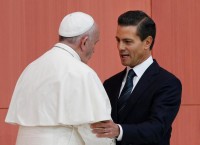
Pope Francis talks with Mexican President Enrique Pena Nieto during a meeting with representatives of civil society and the diplomatic corps at the National Palace in Mexico City Feb. 13. (CNS photo/Paul Haring)
MEXICO CITY (CNS) — Pope Francis told Mexico’s president and government officials that the country’s future can be bright only if government and business leaders put an end to a culture of “favors” for the influential and scraps for the poor.
“Experience teaches us that each time we seek the path of privileges or benefits for a few to the detriment of the good of all, sooner or later the life of society becomes a fertile soil for corruption, drug trade, exclusion of different cultures, violence and also human trafficking, kidnapping and death, bringing suffering and slowing down development,” the pope said Feb. 13 during a meeting with the leaders at the National Palace.
The pope had landed in Mexico the evening before for a six-day visit. Because of the late hour and the long flight from Rome via Cuba, the official welcoming ceremony was scheduled for the next morning. But that did not stop thousands of Mexicans from packing stadium-type stands at the airport to welcome the pope with singing, dancing and a mariachi band.
Thousands of people also lined the streets from the airport to the Vatican nunciature, where the pope was staying, and a large crowd was gathered there to greet him.
Pope Francis, stopping outside for a while, told them, “Tonight, do not forget to look at Mary and think of the people we love and those who do not love us.” He said good night after leading them in the recitation of the Hail Mary.
Before the trip, the pope repeatedly spoke of his devotion to Our Lady of Guadalupe and his desire to spend time in prayer before the tilma or cloak imprinted with the image of Mary.
Pope Francis gave President Enrique Pena Nieto a mosaic of Our Lady of Guadalupe made by the Vatican Mosaic Studio; it includes tiny glass tiles that encase gold leaf.
Although protocol dictated the pope’s time at the palace be treated as a state visit, Pena Nieto told the pope, “Your visit transcends an encounter between two states; it is the encounter of a people with its faith.”
“You will find a generous and hospitable people,” the president told him, “a people who are Guadalupan.”
Speaking to the president and government officials, the pope insisted that, like Mary, who took on the traits of Mexico’s indigenous peoples in a sign of respect, Mexico’s leaders must value the multicultural makeup of its people.
Mexico’s “ancestral culture” combined with the youth of its population “should be a stimulus to find new forms of dialogue, negotiation and bridges that can lead us on the way of committed solidarity,” the pope said.
Those who identify themselves as Christian must be exemplars of dialogue and solidarity, he said, and those who truly value politics as public service must as well. There is no other way, the pope said, to build “a society in which no one feels like a victim of the culture of waste” and, therefore, disposable.
Mexico’s population is about 120 million; 28 percent of them are 14 years old or younger and another 18 percent are 15-24 years old. The Organization for Economic Cooperation and Development ranks Mexico as one of the countries with the greatest income inequality and reports 21 percent of its population lives in poverty.
Pope Francis told government leaders that those young people are a treasure, a bundle of energy and hope for the future. But the country cannot realize that future hope if the current generation of adults and leaders do not teach values and, especially, if they do not live them.
“A hope-filled future is forged in a present made up of men and women who are upright, honest and capable of working for the common good,” the pope said, adding that, unfortunately, today the common good “is not in such great demand.”
With dialogue and respect, he said, all Mexicans can be helped to contribute to building a better society where there is “real access” to necessary material and spiritual goods: “adequate housing, dignified employment, food, true justice, effective security, a healthy and peaceful environment.”
Cookies, sombrero and a shoe shine: Even reporters give pope gifts
By Cindy Wooden
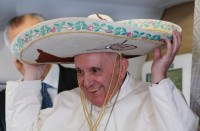
Pope Francis tries on a sombrero while meeting journalists aboard his flight to Havana Feb. 12. Traveling to Mexico for a six-day visit, the pope is stopping briefly in Cuba to meet with Russian Orthodox Patriarch Kirill of Moscow at the Havana airport. (CNS photo/Paul Haring)
ABOARD THE PAPAL FLIGHT TO HAVANA (CNS) — Making his 12th trip abroad, Pope Francis was accustomed to collecting interview requests, notes and gifts from the journalists who travel on the plane with him.
But his flight to Cuba Feb. 12 had a unique moment. Noel Diaz, who lives in Los Angeles and was covering the trip for ESNE — a Catholic radio and television network — asked the pope if he could shine his shoes “in memory of all those people who struggle daily to put bread on their tables.”
Diaz told the pope that when he was growing up in Tijuana, Mexico, his mother told him he would have to delay his first Communion because she could not afford to buy him black pants and a white shirt. Although not quite 8 years old, Diaz said he went out with a shoe-shine box to earn the money for the clothes and was able to receive his first Communion with his peers.
The pope reluctantly conceded to Diaz, and the man knelt in the aisle of the plane and brushed the pope’s shoe. Then he gave the pope a shoe-shine kit.
Valentina Alazraki, a correspondent for the Mexican Televisa and the journalist who has done the most papal trips, gave the pope a large sombrero decorated with his coat of arms, his image and the image of Our Lady of Guadalupe.
Alazraki had given similar hats to St. John Paul II and Pope Benedict XVI when she traveled with them to her homeland. The pope put the sombrero on briefly and smiled for the cameras.
Nestor Ponguta Puerto, a radio journalist from Colombia, gave Pope Francis two golden bags of Colombia’s finest coffee and asked the pope when he would visit the South American country. If talks between the government and opposition groups continue and a peace treaty is signed, the pope said, “I will go next year.”
The pope also received a white rose, a box of homemade chocolate chip cookies and a brand new zucchetto or scullcap. He put it on his head for a few minutes, then gave it back to the TV correspondent as a souvenir.
As is his custom at the beginning of a trip, Pope Francis thanked the traveling press corps and semi-apologized for the crazy hours they would work in Cuba Feb. 12 and in Mexico through Feb. 17.
“The schedule is full,” he said.
Although the planned stop of three-and-a-half hours in Cuba complicated matters, Pope Francis told reporters the meeting there with the head of the Russian Orthodox Church “was very much desired by my brother (Patriarch) Kirill and me.”
And speaking of Mexico, Pope Francis said, “My greatest desire is to pause” in front of the tilma, the cloak bearing the image of Our Lady of Guadalupe.
The tilma “is a mystery that is studied and studied, but there are no human explanations” for how the image was produced, the pope said. “It’s something of God.”
Before greeting each member of the media one by one, Pope Francis publicly thanked Alberto Gasparri, the main papal trip organizer who has worked at the Vatican 46 years and is about to retire.
The best news. Delivered to your inbox.
Subscribe to our mailing list today.





